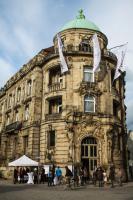iwalewahaus
Articles tagged with iwalewahaus
Tag Archive
- african citys
- Aimé Césaire
- Alqueva
- An Outpost of Progress
- angola music
- antiracism
- apartheid
- Archives
- artistic movements
- Bahia
- Berlin
- biblioteca
- Bienal de Coimbra
- Black Lives Matter
- Caldo do Poeira
- Capeverdean
- Carnaval
- collector
- colonial memory
- colonial order
- colonialismo
- Comité Invisível
- curator
- curatoria
- departures
- descolonization
- Ella Baker
- emigrants
- end of the world
- end sars movement
- escritor
- esse cabelo
- ethnicity pay gap
- europa oxalá
- favela
- Felix Schumba
- fronteiras
- Gérard Quenum
- gkjg
- hair
- heteronormative
- intellectual extractivism
- Interwinings: peripheral arts
- Iwalewahaus –
- Jacques Rancière
- João de Deus Lopes da Silva
- joao viana
- Jornalism
- kim praise
- kurdish
- kwame brathwaite
- language diversity
- Lee-Ann Olwage
- LGBTI
- Lilia Schwarcz
- Luso-Tropicalism
- lusophony
- martin Luther king jr
- media
- Meet
- Middle East
- mil e uma noites
- militant cinema
- Moçâmedes
- Monuments in Reverse
- ocupações temporárias
- opression
- pintura
- poland
- Política Cultural
- Portraits
- post-colonialism
- preforming artists
- produção audiovisual brasileira.
- radio
- representação
- representações
- representações de áfrica
- return
- Samira Vera-Cruz
- school
- sculpture
- security
- semba
- símbolos
- slags
- SOS Racismo
- sudoeste
- Tahir Square
- the end
- The Sudanese Revolution
- theatre
- tunisia
- Visuality
- Vital Matter
- Vitor belanciano
- Walter Salles
- war
- Word
- xhibition of the Portuguese World
 After departing from Germany, they settled in Australia and began archiving their visual memories, which were eventually sent to Iwalewahaus. Their professional legacy has since been digitized and shared with the Centre of Black Culture and International Understanding (CBCIU) in Osogbo, Nigeria. Their collection has been researched in the frame of collaborative research projects and individual PhD topics, questioning Ulli and Georgina Beiers legacy and its inherent dominant narratives as well as contributing to a broader understanding of Modernisms. Currently, Iwalewahaus as an institution still feeds from its initial strategies, trying to navigate between different stakeholders and ethical commitment.
After departing from Germany, they settled in Australia and began archiving their visual memories, which were eventually sent to Iwalewahaus. Their professional legacy has since been digitized and shared with the Centre of Black Culture and International Understanding (CBCIU) in Osogbo, Nigeria. Their collection has been researched in the frame of collaborative research projects and individual PhD topics, questioning Ulli and Georgina Beiers legacy and its inherent dominant narratives as well as contributing to a broader understanding of Modernisms. Currently, Iwalewahaus as an institution still feeds from its initial strategies, trying to navigate between different stakeholders and ethical commitment.  I think we always have the responsibility of looking into the ghosts of these colonial dreams and taking the ideas further. For example, we must rethink what are artwork features and what exactly defines them? Institutions change, in a slow and tedious way, but it happens. If we also think about the thesis and how it is configurated, how free can we be about the aesthetic part of it? Now we can offer “decolonize art studies” as a course. All the reconfigurations are a very long process to be achieved. A very important thing I would like to highlight is that where you are you must do your work and contribution. We should try to influence others with our work, inspiring them and trying to change what we know is wrong.
I think we always have the responsibility of looking into the ghosts of these colonial dreams and taking the ideas further. For example, we must rethink what are artwork features and what exactly defines them? Institutions change, in a slow and tedious way, but it happens. If we also think about the thesis and how it is configurated, how free can we be about the aesthetic part of it? Now we can offer “decolonize art studies” as a course. All the reconfigurations are a very long process to be achieved. A very important thing I would like to highlight is that where you are you must do your work and contribution. We should try to influence others with our work, inspiring them and trying to change what we know is wrong. 